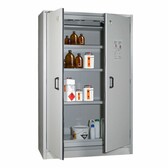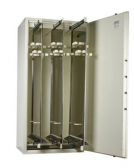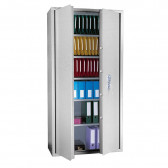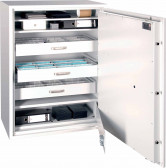In any medical facility, the storage of medicines is one of the most crucial security issues.
Legal basis
The new Ordinance of the Minister of Health, as amended, does not contain specific guidelines for the storage of medicines or the conditions required in a medicine storage area:
1. Narcotic drugs, psychotropic substances and group I-R precursors and preparations containing these drugs or substances shall be stored in the pharmacy, subject to paragraph 2, in a manner that protects them from theft and destruction.
2. Narcotics of groups I-N and II-N and psychotropic substances of group II-P shall be stored in appropriately secured rooms, in closed metal cabinets or cassettes permanently fixed to the walls or floors of the room, in a place not visible to patients.
Medicine cabinets are used to store and protect medicines from unauthorised access, moisture, light and temperature. Medicine cabinets should be made of high quality materials to ensure durability and hygiene. They should also be equipped with locks, alarms, access control and operation recording systems. Medicine cabinets should be tailored to the needs and requirements of the users to ensure easy and quick access to medicines, while maintaining order and clarity.
Who is affected by the storage of medicines?
The pharmaceutical law does not explicitly specify this, but such medicinal products are stored in many medical units. These include, of course, pharmacies and hospitals, where, in addition to a wide range of narcotics, there will be cytotoxic drugs, psychotropic drugs and other preparations, which must be stored in a way that ensures safety, preferably in specially designed cabinets.
Why is the storage of medicines so important?
The storage of medicines in hospital is a very important aspect of ensuring the safety and quality of patient care. Medicines should be stored in appropriate conditions, in accordance with the manufacturer's recommendations, and out of the reach of unauthorised persons. Medicines should also be properly labelled, segregated and inventoried to prevent confusion, loss or theft. The storage of medicines in a hospital requires strict adherence to procedures and rules, which are set out in legislation and accreditation standards.
Pharmacy and hospital safes
Safes and cabinets for storing medicines have several features applicable to pharmacies and hospitals. Let's take a look at what qualities a medicine safe should have.
Structural safety
As mentioned above, the Regulation of the Minister of Health does not explicitly require an anti-burglary class for medicine cabinets, so the most common choice is class S1 according to EN 14450. These are metal cabinets with a multilateral locking mechanism, locked with a lock certified by the Institute of Precision Mechanics. However, there are cases, e.g. due to the anti-drug principle, when safes are chosen that are more resistant to attempted break-ins in the literal sense. Narcotic drugs can be a tasty morsel both for people addicted to narcotics and for those for whom such preparations can be a source of income.
Interior fittings
Storing medicines is not a simple matter. Pharmacists, doctors, especially in hospital wards, need to know very well where psychotropic drugs are and where narcotic drugs are, where cytotoxic drugs are and where narcotics are. Adequate segregation of medicines is essential, as it reduces response times and, in many cases, the fastest possible administration of medicines is life or death.
For this reason, drug cupboards and safes can be equipped with drawers that are appropriately labelled and numbered, with separate places for boxes, syrups etc., for example according to their expiry date (expiry date is one of the most important aspects of medical products).
Photosensitive medicines should be stored separately, expired medicines apart, narcotic substances separately and medical equipment such as properly calibrated thermometers separately. Everything must be in its place.
Which safe to choose for storing medical documents?
The pharmacy and hospital safe is not just a place where medicines are stored. Despite increasing digitalisation, there is still a gigantic circulation of documents, including those containing sensitive data: patient data, medical and treatment histories, personal data. The current data protection regulation also requires medical units to store the above in a way that ensures security. This of course also applies to pharmacists; prescriptions, stock documents and revenue records are stored in pharmacies.
Document cupboards
We primarily recommend cabinets that combine burglar and fire resistance for document storage. Such products are available in different series, depending on the requirements of the individual unit.
Drop-in safe
Despite the increasing prevalence of cashless trading, there are still patients who use cash. The pharmacy will therefore find use for drop safes, in which even large amounts of money can be deposited securely. The drop box system works roughly like a letterbox: envelopes of banknotes can be put into the safe, but only an authorised person with a key or knowledge of the code can take the contents out. For cash storage in the pharmacy, especially in the case of shifts and high staff turnover, we recommend these products.
Data media safes
With increasing digitalisation, paper documents are being replaced by databases. While for small units such as pharmacies this is not a major problem, but for a specialist hospital the way to store digital data already means a challenge. Hospitals have servers where terabytes of data are stored in a designated area, secured by a fireproof door. However, if you don't need a separate server room, a suitably designed, fireproof safe with tape and disk compartments can be used to secure your data.
Cabinets for hazardous materials
In addition to medication, hospitals and pharmacies will contain a mass of substances that are potentially hazardous due to their susceptibility to flammability, above all alcohol-based preparations. Safe storage of volatile substances requires tight, fire-resistant cabinets.
A collateral type of this kind of security are cabinets for batteries and accumulators. Pharmacies offer patients a multitude of battery-powered electronics: thermometers, lactation equipment, blood pressure monitors, etc..
Summary
As it turns out, medical facilities, pharmacies and hospitals, have a myriad of security needs. Apart from the rather obvious need to secure drugs, narcotics or psychotropic substances, these institutions handle cash, documents, store data and flammable substances. If you are running this type of business and are in doubt about what to choose – contact us. Just as you help the patient to take care of their health, we will help you to take care of safety.





